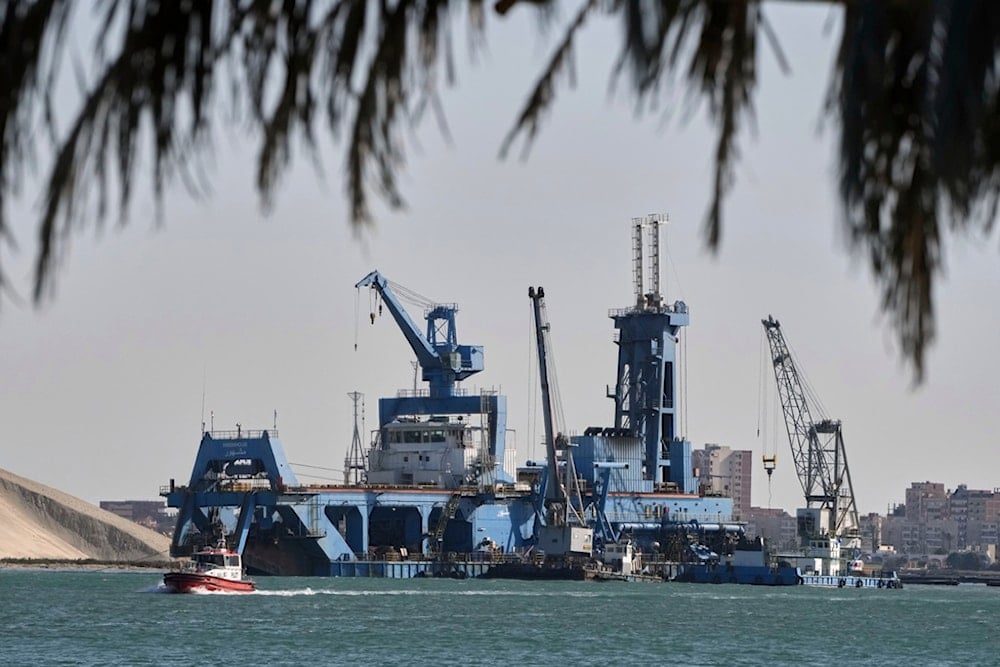Trump pressures Egypt for free Suez access for US war on Yemen: WSJ
Egypt's president pushed back against Trump's comments, saying a ceasefire in Gaza would be a more effective path to ending the Red Sea blockade.
-

Egyptian dredging ship, Mashhour, sails at the Suez Canal in Ismailia, Egypt, Wednesday, April 16, 2025 (AP Photo/Amr Nabil)
The Wall Street Journal on Wednesday revealed that Donald Trump is pressuring Egypt to allow US ships free access to the Suez Canal, as compensation for America's ongoing military campaign against Yemen.
The demand was made amid a sustained US bombing campaign targeting Yemen, which has launched attacks on Red Sea shipping lanes connected to Israeli trade. Yemeni forces have made it clear that their actions are a form of blockade against the occupation, framed as direct solidarity with the people of Gaza in the face of an ongoing genocide.
"American Ships, both Military and Commercial, should be allowed to travel, free of charge, through the Panama and Suez Canals!" Trump wrote on Truth Social. "Those Canals would not exist without the United States of America."
Trump also raised the issue in a recent phone call with Egyptian President Abdel Fattah el-Sisi, according to sources familiar with the conversation. He reportedly urged Egypt to either support the US campaign militarily, provide intelligence, or financially compensate Washington for what he framed as the benefits of restored canal traffic, despite the fact that Egypt has not requested this military intervention.
Blockade resistance
El-Sisi pushed back, saying a ceasefire in Gaza would be a more effective path to ending the Red Sea blockade. According to the Wall Street Journal, the Egyptian president stated that Yemen's campaign began in direct response to the war on Gaza, not out of unrelated hostility.
"President Trump's operation to restore freedom of navigation through the Red Sea directly benefits American workers and consumers, but it also benefits partner nations globally, including Egypt," said National Security Council spokesperson James Hewitt. "The burden for a broadly beneficial military operation should be shared broadly, and free transit for US ships through the Suez Canal is one way to share that burden."
But many observers view the framing of this campaign as "freedom of navigation" as a deliberate distortion. In reality, Washington is using military force to crush a political and economic act of resistance by Yemen, which has explicitly conditioned the reopening of the Red Sea on an end to "Israel's" assault on Gaza.
Profit diplomacy
Trump officials were reportedly discussing how to extract financial returns for the campaign. "As I heard it, the president was clear: green light, but we soon make clear to Egypt and Europe what we expect in return," said a participant identified as SM, likely Trump advisor Stephen Miller. "If the US successfully restores freedom of navigation at great cost there needs to be some further economic gain extracted in return."
Egypt's media pushed back against Trump's demands. Prominent journalist Lamees El Hadidi responded that "the Suez Canal was officially inaugurated in 1869 when you had just ended your civil war, you still owned slaves and you barely had an operational railway." Ahmed Moussa called the demand "a dangerous transgression," warning of the consequences for Egypt-US relations.
Read more: US loses F/A-18 from USS Truman in Red Sea in suspicious incident
The Suez Canal has seen revenues plunge due to the blockade, which has forced shipping to reroute via longer and more expensive journeys. According to Egypt's canal authority, revenue dropped from $10.3 billion in 2023 to just $4 billion in 2024.
Yet Yemen's position has remained clear: no Israeli-linked shipping will pass until the assault on Gaza ends. And as Washington deepens its military entanglement, it now seeks to bill its allies for a war they never asked for, one carried out not in the name of peace, but in defense of Israeli supply lines.

 4 Min Read
4 Min Read








